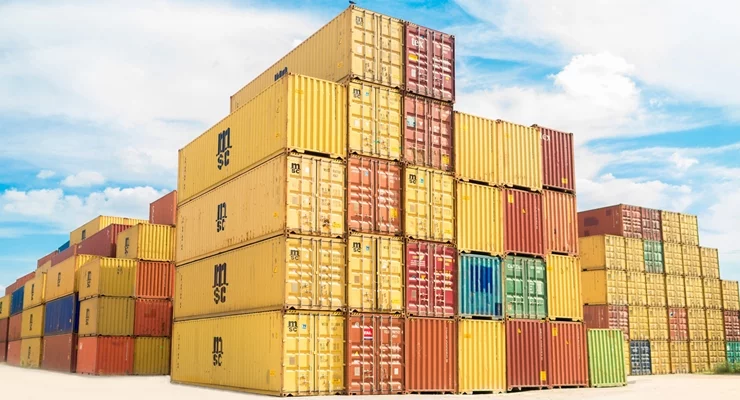What is Blockchain Logistics?
Blockchain logistics is a new way of recording information. The blockchain system is so secure that it makes it impossible to change, hack, or cheat the system. A blockchain is a kind of digital ledger. It records transactions that can be duplicated and distributed on the various computer systems across the blockchain network.
A blockchain consists of various blocks of information. These blocks can be related to each other, which may add before or after a particular block. Thus, it makes a blockchain.
Each block in the chain consists of multiple transactions. Every time a new transaction takes place, its record is added to each participant's ledger. This type of database is managed by multiple participants. It is known as Distributed Ledger Technology (DLT).
If someone tampers with a block of information, it would immediately be caught. This makes it very secure from hackers. If hackers want to change the data in the blockchain, they would have to change the data in every distributed block.
Digital currencies such as Bitcoin and Ethereum are based on blockchain and are constantly growing. As more and more blocks are being added to it, the security of it is also increasing.
How Blockchain Logistics works
Whenever a transaction takes place, it is recorded as a block of data.
These transactions show the position of an asset that might be tangible or intangible in nature. Each data block is capable of recording information according to the user's choice. Such as when, where, what, how, etc.
Every block is connected to the blocks before and after it
These blocks form a chain of data. An asset moves from one owner to another, thus changing its ownership. The exact time of the various transactions is recorded in the block in a sequential manner. The blocks confirm and secure this data by linking with each other. It prevents any block from being tampered with or any block from being inserted in between.
The transactions secured together to form an irreversible chain: a BLOCKCHAIN.
Every new block that is added, adds to the strength of verification of the previous block. This, in turn, strengthens the entire blockchain. This makes the blockchain tamper-proof. This eliminates the possibility of data being manipulated by a foreign entity. This builds a blockchain into a ledger that its users can trust completely.
Examples Of Companies Using Blockchain's Logistics Capabilities.
CHRONICLED
Chronicled is based out of San Francisco, California. It has combined blockchain with AI and IoT devices. This helps to automate traceability and instantly approve financial transactions in the logistics industry. The blockchain-enabled IoT devices give companies detailed insights into the transfer of ownership of the goods and the environmental conditions. This helps a business to securely and efficiently move their products all over the world.
Blockchain Logistics- SHIPCHAIN
Shipchain is based out of Los Angeles, California that was founded in 2017. It has built a logistics platform that has been backed by blockchain tech. It supports the logistics process from end to end. Their platform allows all parties on the blockchain to stay updated about the whereabouts of a container, its arrival times, etc. The information is accessed via an encrypted ledger.
Blockchain Logistics-MODUM
Modum is based out of Zurich, Switzerland. It is a company focused on pharmaceuticals. Its blockchain-enabled products help manage the production and shipment of pharmaceutical products. The company has temperature monitors, precise route tracking, and smart contracts. It makes sure that medicines arrive safely and on time.
Blockchain Logistics-300CUBITS
300Cubits is based out of Hong Kong, China. 300cubits has tokens that are cryptocurrency for the logistics field. It locks into smart contracts, uses the company's TEU tokens. This ensures the retailers that they will provide a certain quantity of products to ship. Shipping companies set deadlines and quality standards for the shipping process. The tokens provided by TEU bring an element of trust to the process.
PROVENANCE
Provenance is a company based out of London, England. By using blockchain, Provenance increases transparency in the retail industry. Provenance retailers can document and showcase the origination of their products and their supply chains on a ledger. This gives the consumers a better idea of their business practices. Provenance holds retailers accountable by using blockchain in the meanwhile helps members make trusted and higher-quality products.
KOOPMAN LOGISTICS
Koopman Logistics is a company based out of Amsterdam, Netherlands. It is an automotive transportation company. It uses blockchain to ship cars all over the world. Using the blockchain's ledger tech reduces the use of paper, deploys a faster payment process, and makes the shipping process more secure. Koopman Logistics became the world's first automotive logistics company, In April 2018 to deliver a vehicle via blockchain process. It was completely paperless.
GUARDTIME
Guardtime is based out of Irvine, California. Its blockchain has the main aim of increasing transparency and trust, the lack of which causes most of the issues in the industry. Guardtime uses highly encrypted smart contracts. Its decentralized shipping tracking can quickly verify data and protect it from manipulation and cyber attacks.
BLOCKFREIGHT
Blockfreight is based out of San Francisco, California. A lot of wasteful payments occur in the logistics business. Blockfreight develops blockchain-based tech that eliminates such instances throughout the shipping process. Blockfreight currently runs its software on the Bitcoin blockchain for easy payments and safe transactions between parties in a supply chain.
MULECHAIN
Multichain is located out of Newport Beach, California. It is a decentralized personal delivery network. It uses smart contracts based on blockchain. The shippers have an agreement with mules who are headed to the same destination. Once both the parties settle on a price, mules personally deliver the shipper's items. MCX tokens are used as collaterals. After the shipping is completed, the mules the tokens as payment.
DEXFREIGHT
It is a company based out of Sunrise, Florida. It has the industry's first blockchain-backed PtoP marketplace. The users can utilize this marketplace for both shipping and hauling. It uses encrypted identity management, smart contracts, and token payments. This helps increase transparency in the process and reduces friction among the users.
SKUCHAIN
It is a company based out of Mountain View, California. Skuchain creates various ledger tech for the logistics industry. The company has Popcodes. They are an abbreviation for Proof-of-Provenance codes. It provides track-and-trace technology for items of high value in a shipment. It gives companies permission access to data and details about other supply chain parties to increase trust levels.
SYNCFAB
It is a company based out of Los Angeles, California. SyncFab has its focus on the manufacturing supply chain. Syncfab has designed its platform in such a way that it lets users access real-time product manufacturing quotes. It gives users access to detail-oriented deals with factories and shippers using smart contracts and also tracks the product creation process. Companies and organizations like NASA's Jet Propulsion Lab and Google, among many others, have used Syncfab's services.
Conclusion:
Being a safer and more robust data collection system, Blockchain is the most preferable in today’s day and age. With the rising cyber attacks and threat to privacy, Blockchain offers that extra security on which you can rely. Not just in logistics, Blockchain is going to prove to be more useful in the coming times for personal use cases too.





